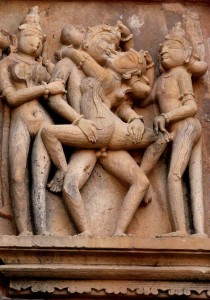Khajuraho and Kamasutra fire the fancy of any foreign tourist to India. Add Spirituality and the heady mix becomes a killer app for seekers of quick-fix salvation for paying a visit to India! Biologically sex evolved as a reproductive mechanism to possibly capture the advantageous heritable genetic traits from a partner. Only humans and a few animals like bonobos and dolphins indulge in recreational sex. Sex is closely tied to sensory perceptions and lies within the realms of the mind. Salvation transcends both senses and mind. “Rajneesh, the ‘horse’s mouth’ concerning the topic of enlightenment for Westerners for many years,” regrets James Swartz, “wedded two largely incompatible concepts, sense enjoyment and enlightenment.” One may lose ‘self identity’ and get enwrapped in an inexplicable joy in either of them as Brihadaranyaka Upanishad says. But the bliss of enlightenment and the pleasure of sensual gratification are totally different. Our brains can show it all very clearly!
Human brain is a mass of interlinked neurons piled up in three layers. At the bottom is the most primitive brain common to all animals. Continue reading

